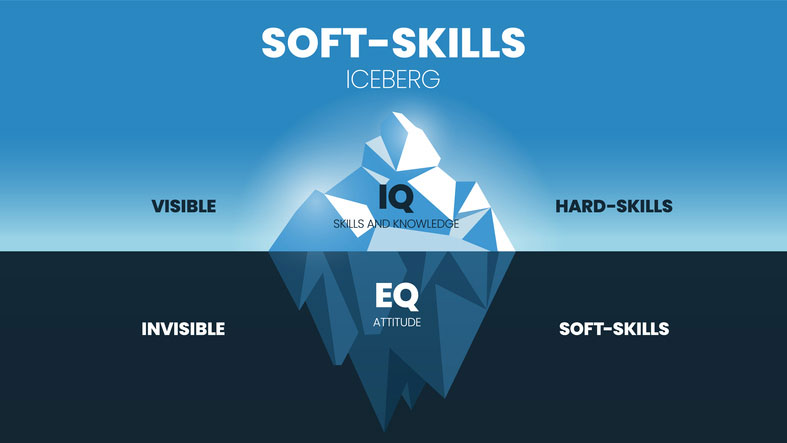Written by Rebecca Turley

Successful supply chain managers are highly flexible business professionals who plan, analyze, monitor, coordinate, and manage activities within a massive and often unpredictable game of connect-the-dots.
Supply chain management explores the interconnectedness of our global economy and the value of establishing partnerships. And though specific competencies vary somewhat based on industry specialization and position in the supply chain, you can still pin down the key blend of hard and soft skills it takes to make it in this field.
Supply Chain Managers Need Hard Skills in Management and Analysis to Get the Job Done

Acquired through education, formal training, and experience, hard skills in supply chain management allow supply chain managers to serve as skilled logisticians, adept negotiators, insightful forecasters, and proficient planners. And that’s just to start.
Today’s in-demand SCM professionals come equipped with these key hard skills:
Inventory Management
Inventory management is a critical piece of the supply chain that involves the tracking of unfinished and finished goods, from the sourcing of raw materials through the point of sale.
On the post-production side, inventory represents as a company’s most important asset and the place where supply chains and operations converge. Too little inventory can have an adverse effect on customer satisfaction, while too much inventory can mean storage costs, unsold product, and the risk of product aging out, all of which can devalue a brand. Along all points of the supply chain, supply chain managers must have an appreciation and understanding of the advanced methods and technologies used to manage inventory.
Project Management
The scope of supply chain management projects can range from implementing strategies to reduce inventory processing times, rolling out a new enterprise software system, outsourcing part of the manufacturing process or transitioning to new global suppliers.
Some of the project management strategies used in supply chain management include:
- Project integration management: This strategy involves identifying all the factors associated with a project (e.g., tools, methods, staffing needs, risks, constraints, etc.) and considering how they affect one another and the project.
- Project scope management: Supply chain managers in this role are responsible for studying current market demand and identifying any restrictions, legal requirements, and infrastructure needs to achieve efficiency and cost-effectiveness.
- Agile scheduling and planning: This strategy involves overseeing the schedules of deliveries necessary to meet project requirements throughout the project's life cycle.
- Resource management: This strategy includes the oversight of all people, equipment, resources, and time. Supply chain managers in this role must consider how best to use limited resources.
Their role also includes communicating with both internal and external stakeholders to provide project updates and ensure a project’s successful execution. They use mapping and tracking tools to keep resources and time allocation for different tasks in check throughout a project’s life cycle.
Risk Management
Supply chain managers must be able to analyze, identify, and take steps to mitigate internal and external risks within their end-to-end supply chain.
Internal risks may include labor shortages, financial instability, or poor management. External risks may include geo-political issues, climate change, trade barriers, and raw material shortages. External risks, of course, are harder to predict and certainly harder to overcome.
Supply chain managers must be able to make swift decisions when internal or external issues create a shortage of materials, a delay in production or delivery, or other issues that threaten supply chain resiliency.
SCM professionals often turn to the PPRR model, a popular strategy that serves as a blueprint for managing risk in the supply chain:
- Prevention: Implementing risk mitigation efforts
- Preparedness: Developing a contingency plan in the case of a crisis
- Response: Putting the contingency plan into action
- Recovery: Returning to normal operations as quickly as possible
Risk assessment software that leverages predictive analytics to collect historical data to identify trends also allow SCM pros to better understand evolving risks.
Data Analysis
Data analysis skills include the ability to:
- Prioritize large quantities of information
- Quickly extract the necessary information
- Make sense of the relevant data and use to make decisions
Supply chain managers skilled at integrating data analysis into their decision-making process can optimize performance, analyze trends, and create stronger, more resilient supply chains.
Supply chain managers may not need to master advanced analytics, but since so much in the supply chain world depends on drawing conclusions from large data sets, the role requires a working knowledge of basic data analysis and analytics tools.
Operations Management
Skills in operations management can’t be undervalued in the field of supply chain management. Operations encompass all business activities that go into producing the product customers pay for, right up to and including the manufacturing of the market-ready product. In many companies, even supply chain and logistics functions fall under the broader umbrella of operations.
Skills in operations management include the ability to coordinate product design, production, planning, and workflow. This means managing staff and work schedules, overseeing budgetary activities, and directing and coordinating product production, sales, and/or distribution.
Operations management skills are vital because they allow SCM professionals to create more efficient processes that drive the flow of business within the larger supply chain.
Supply Chain Managers Need the Soft Skills to Build Partnerships and Navigate the Complexities of Global Supply Chains

Formal, technical knowledge in operations management, risk management, data analysis, and the like may be the nuts and bolts of the supply chain management profession. But to get the job done, you also need to be able to think on your feet and make negotiations on the fly, problem solve, and be open to outside the box solutions. This is a field where those kinds of soft skills are valued as much as hard skills.
Some of the most important supply chain management soft skills include:
Problem-Solving
There are countless variables and moving parts in the supply chain, any one of which can go wrong at any time. Being able to navigate these problems and find swift solutions is critical. Thinking outside the box to develop creative workarounds in record time can prevent a small kink from becoming a full-blown catastrophe.
Adaptability
Which brings us to adaptability. The ability to think on the fly and redirect your course of action with little to no warning is standard operating procedure. From unexpected changes in production schedules to transportation delays to shortages of raw materials, anything that can go wrong eventually will. Being ready for anything and able to adapt at a moment’s notice in this complex environment is crucial for long-term success.
Communication
Functioning supply chains are built on outstanding communication, both within an organization and with supply chain partners near and far. Today’s supply chains are global by nature. Supply chain managers are responsible for navigating everything from language barriers to legal requirements to customary norms when communicating with partners around the globe.
Colaboration
Supply chain and logistics management is a field that requires building and nurturing partnerships with other companies. Successful supply chain managers collaborate with supply chain partners to build strong relationships, overcome challenges, save money, and build long-term, mutually beneficial partnerships.
Negotiation
Resources, time, money – they’re all up for negotiation in supply chain management. Whether you’re working with suppliers to secure the best prices on raw materials or with transportation companies to set suitable delivery schedules, strong negotiating skills are a must.
Time Management
There’s no time to waste in supply chain management. Decisions must be made, and actions must be taken, without delay, to minimize risk and ensure the supply chain keeps moving. And when issues do present themselves, solutions must be arrived at just as quickly. Time management in this field also includes knowing when to delegate or outsource tasks, implement data solutions, and create teams to tackle complex projects.







